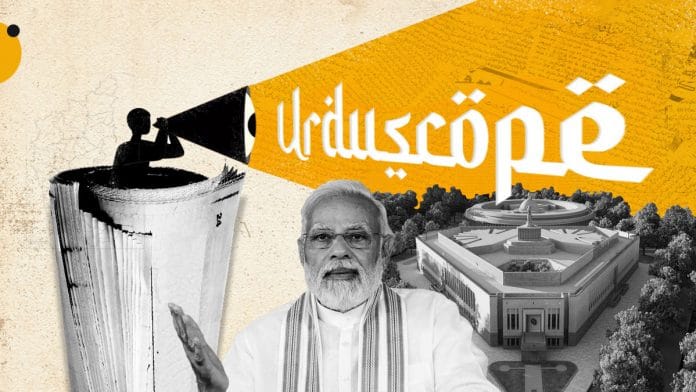New Delhi: The inauguration of the new Parliament building on 28 May and its boycott by 20 Opposition parties remained on the front pages of the Urdu press for most of this week.
Opposition parties have objected to the Bharatiya Janata Party (BJP) government’s decision to have Prime Minister Narendra Modi inaugurate the building instead of President Droupadi Murmu.
While two editorials were critical of the Modi government’s decision, one took a more objective view to say that it was necessary for both the Modi government and the Opposition to be “flexible” about it since it concerns India’s democracy.
Among the other topics that were covered prominently by the Urdu press this week were the Reserve Bank of India’s (RBI) decision to withdraw Rs 2,000 notes from circulation, the ‘Third G20 Tourism Working Group Meeting’ that was held in Srinagar between 22 and 24 May, the Gyanvapi mosque dispute and the Union Public Service Commission’s (UPSC) final results for last year’s civil services examination.
ThePrint brings a roundup of all that made headlines in the Urdu press this week.
Also Read: ‘First Kashmir Files, now The Kerala Story’: Films being used to fuel hate, writes Urdu press
Row over the inauguration of new Parliament building
All three Urdu newspapers — Inquilab, Roznama Rashtriya Sahara, and Siasat — reported the Opposition’s boycott of the inauguration.
On 25 May, Inquilab’s editorial looked at the optics of the issue. In 2020, India’s then president Ram Nath Kovind, a Dalit leader, wasn’t given the opportunity to lay the foundation stone of the new Parliament, the editorial said.
The same thing was repeated with Droupadi Murmu, India’s first tribal president and the incumbent head of state, the editorial said, wondering if the government thought that such a large part of India’s population was not worthy of such an honour.
On 25 May, Sahara said the move was an insult to India’s democracy. Parliament, the editorial said, wasn’t merely a building made of brick and stones. It was the embodiment of Indian democracy and its constitutional values. An inauguration such as this, the editorial said, should be free of controversies. Yet the new building has been rife with them ever since the time it was first announced (in 2019), the editorial said.
On the other hand, Siasat’s editorial said it was necessary, at least where the Parliament House was concerned, that both the ruling dispensation and the Opposition should adopt a more “flexible” approach. It was a question of Parliament’s sanctity, the editorial said, and therefore, any differences should be resolved with consensus.
On 26 May, the newspapers reported a Public Interest Litigation (PIL) had been filed in the Supreme Court seeking directions to the Lok Sabha Secretariat and the central government to have the President of India inaugurate the new Parliament building.
That petition has now been declined by the court.
Withdrawal of Rs 2,000 notes
On 20 May, all three Urdu newspapers prominently carried the RBI’s announcement that it was withdrawing Rs 2,000 notes from circulation. The high denomination note was introduced in 2016, when the Modi government had withdrawn two major high-value currencies — Rs 500 and Rs 1,000.
In its announcement, the RBI clarified that although it was withdrawing the Rs 2,000 note, it would continue to remain a legal tender and that the notes could be deposited or exchanged at banks until 30 September, 2023.
However, despite the clarification, the development caused some panic and confusion at banks, which the newspapers reported.
In an editorial on 24 May, Inquilab said that there was no real need to withdraw the note since its printing had stopped in 2018-19. The notes were neither available in large numbers nor were they accepted by the public, the editorial said, adding that, in such circumstances, even if the RBI hadn’t done anything, the notes would have eventually gone out of circulation on their own.
An editorial in Sahara said that in 2016, while announcing his government’s decision to withdraw Rs 500 and Rs 1,000 notes from circulation, Prime Minister Narendra Modi had asked his countrymen to give him 50 days to weed out “ill-gotten gains”.
Admitting that there would be some challenges initially, Modi said if the public continued to face problems after 50 days, he was willing to face any punishment that the people of the country decided for him, the editorial said.
It was now time to see how long the PM would take to resolve this, it added.
Summits and meetings
All three newspapers reported both the G7 Summit in Hiroshima, Japan, and the G20 Tourism Working Group Meeting that was held on the banks of the Dal Lake in Srinagar.
Modi attended the G7 Summit after he was invited by his Japanese counterpart, Fumio Kishida.
Newspapers prominently covered Modi’s meeting with Ukrainian President Volodymyr Zelenskyy, his visit to Papua New Guinea and talks with its PM, James Marape, and his visit to Australia.
Gyanvapi & civil services exam results
Urdu newspapers also covered results of the civil services examinations and the ongoing Gyanvapi row.
On 23 May, the UPSC announced its final results for last year’s civil services examination. The newspapers reported that the top four ranks had been taken by women candidates and that 32 Muslims had passed the exam.
Also on the same day, newspapers reported that the Gyanvapi Masjid committee had opposed a petition asking the Archaeological Survey of India’s (ASI) survey of the disputed mosque.
The petition was filed after the Allahabad High Court had ordered the ASI to conduct a survey of an alleged Shivling-like structure that was found in the complex last year.
On 24 May, Inquilab and Sahara reported the Varanasi court’s decision to club seven cases related to the dispute.
(Edited by Uttara Ramaswamy)
Also Read: Urdu press hails Congress win in Karnataka, but warns ‘any complacence may undo gains’






